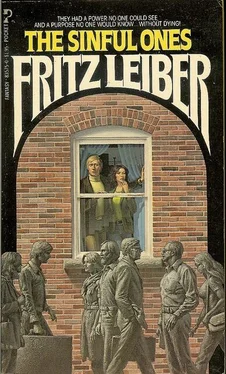And a very cool cat too. It walked suavely toward the door of the Gregg apartment.
But about two feet away it stopped. For several seconds it stood there, head upraised, making no movement, except its fur seemed to thicken a little. Then, very slowly, it looked around.
It stared at Carr.
Beyond the door, the piano started the sprightly second movement.
Carr edged out his hand. His throat felt dry and constricted. “Kitty,” he croaked.
The cat arched its back, spat, then made a twisting leap that carried it halfway up the next semi-flight of stairs. It crouched on the top step, its bugged green eyes peering between the rails of the banister.
There were footsteps. Without thinking, Carr shrank back. The door opened, the music suddenly swelled, and a gray-haired lady in a blue and white print dress looked out and called, “Gigolo! Here, Gigolo!”
She had Jane’s small chin and short straight nose, behind veils of plumpness. Not Jane’s height, thought. She was rather dumpy. Her face had a foolish look.
And she must be short-sighted, for although she looked at the stairs, she didn’t see the cat, nor did she notice Carr. Feeling uncomfortably like a prowler, he started to step forward, then realized that she was so close he would give her a fright.
“Gigolo!” she called again. Then, to herself, “That cat!” A glance toward the dead bulb in the ceiling and a distracted headshake. “Gigolo!”
She backed inside. “I’m leaving it open, Gigolo,” she called. “Come in when you want to.”
Carr stepped out of the darkness with a husky, “Excuse me,” but the opening notes of the fast third movement, played too loudly, drowned him out.
He crossed to the door. The green eyes at the top of the stairs followed him. He raised his hand to knock. But at the same time he looked through the half-opened door, across a tiny hall, into the living room.
It was a smallish room, with too much heavy furniture in addition to the fake fireplace, and too many lace runners on little tables and antimacassars on the head rests and arms of chairs. He could see the other end of the red davenport and the slippered feet of the old man sitting in it. The woman had retired to a straight-backed chair across the room and was sitting with her hands folded, her lips worriedly pursed.
Between them was the piano, an upright. On top of it was a silver-framed picture of Jane.
But there was no one sitting at the piano.
To Carr, the rest of the room seemed to darken and curdle as he stared at the rippling keys.
Then he puffed out his breath. Of course, it was some kind of electric player.
He started to knock, then hesitated because they were listening to the music.
The woman moved uneasily on her chair. Her lips kept anxiously puckering and relaxing, like those of a fish behind aquarium glass.
Finally she said, “Aren’t you tiring yourself, dear? You’ve been at it all day, you know.”
Carr looked toward the man, but he could still see only the slippered feet. There was no reply.
The piano stopped. Carr took a step forward. But just then the woman got up and went over to the piano. He expected her to do something to the mechanism, but instead she began to stroke the air a couple of feet above the piano bench with a downward patting motion.
Carr felt himself shivering.
“There, there, dear,” she said, her face showing that silly, vacant expression he had noticed at the door, “that was very pretty, I know, but you’re really spending too much time on your music. At your age a girl ought to be having fun, meeting other young people. But you keep yourself cooped up.” She leaned forward, bent her head as if she were looking around the shoulder of someone seated at the piano, wagged her finger, and said with a sickly playfulness, “Look at the circles under those eyes.”
The slippered feet protruding from the red davenport twisted. A weary voice said, “Now don’t worry yourself over Jane, Mother.”
The woman straightened. “Too much practicing is bad for anyone. It’s undermining her health—and I don’t care how ambitious she is, or how ambitious you are for her.”
The slippered feet were drawn back. The davenport creaked. The man came into sight, not quite as old as Carr had thought, but tired-looking. His shirt, open at the neck, was made for a detachable collar.
For Carr, time stopped, as if a clockworks universe hesitated before the next tick. In that frozen pause, only his thoughts moved. It was true, then. The dumpy man…The room clerk…Marcia in her bedroom…Last night with Jane—the bar, the music shop, the movie house, the chessplayers…And now this old woman.
All, all automata, machines!
Or else (time moved again) this old woman was crazy.
Yes, that was it. Crazy, insane. Behaving in her insanity as if her absent daughter was actually there. Believing it.
He clung to that thought.
“Really dear,” the old woman was saying vapidly, “you simply must rest.”
“Now, mother, don’t get excited,” the old man said soothingly. “Everything’s all right.”
The father insane too, Carr thought. No, humoring her. Pretending to believe her hallucinations. That must be it.
“Everything isn’t all right,” she contradicted tearfully. “I won’t have Jane practicing so much and taking those wild long walks by herself. Jane, you mustn’t—” Suddenly a look of fear came over her. “Oh, Jane, don’t go. Please don’t go, Jane.” She stretched out her hand toward the hall as if to restrain someone. Carr shrank back. He felt sick. It was horrible that this mad old woman should resemble Jane.
She dropped her hand. “She’s gone,” she said and began to sob.
The man put his arm around her shoulder. “You’ve scared her off,” he said softly. “But don’t cry, mother, please don’t cry. Tell you what, mother, let’s go sit in the dark for a while. It’ll rest you.” He urged her toward the sun porch.
Just then, behind Carr, the cat hissed and retreated a few steps higher, the vestibule door downstairs was banged open, there were loud footsteps, and voices raised in argument.
“But I tell you, Mr. Wilson, you’re just wasting our time. Dris checked. He told us so.”
“He lied. He’d been with those girls two hours when we saw him.”
“He hadn’t!”
“You think not?”
The first voice was brassy, complaining. The second was cool, jolly. They were those Carr had overheard in the cigarette shop.
Before he had time to weigh his fear or even to think coherently at all, he had slipped through the door in front of him, crossed the little hall as rapidly as he dared—Jane’s parents were out of the living room by now—tiptoed down the hallway leading to the back of the apartment, turned into the first room he came to, and was standing with his cheek to the wall, squinting back the way he had come.
He couldn’t quite see the front door. But in a little while long shadows darkened the plaster of the hallway, telling him that someone must be standing in the hall, cutting off the light from the living room.
“Well, she isn’t here,” he heard Mr. Wilson say.
“But we just heard her playing,” came the blonde’s voice, naggingly.
“Be reasonable, Miss Hackman,” Mr. Wilson objected. “You know very well that doesn’t prove anything.”
“But why would Dris lie about checking on her?”
Mr. Wilson snorted. “Dris would lie about anything to get time to be with his current girls.”
“That’s not true!” Miss Hackman sounded as if the remark had stung. “Dris might fool around with girls when we’re all having fun together. Naturally. But not just by himself, not alone!”
“You think he doesn’t have his private lusts? You think you’re the whole show?”
Читать дальше









